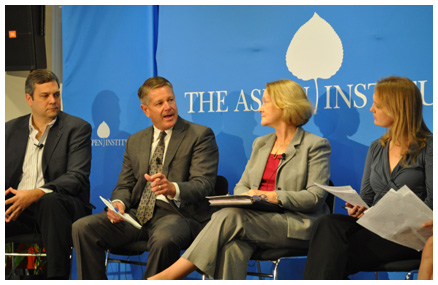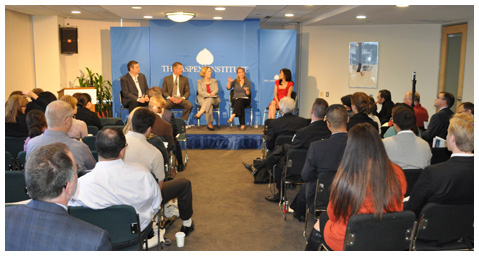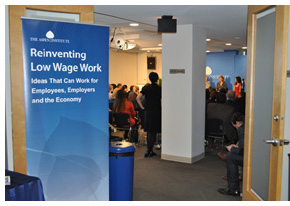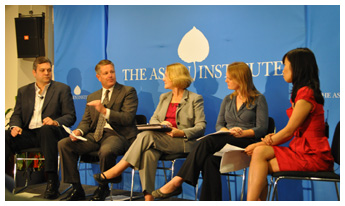 The state of the American construction workforce was described as “the Wild West” during a lively panel discussion at the Aspen Institute in Washington, DC this week.
The state of the American construction workforce was described as “the Wild West” during a lively panel discussion at the Aspen Institute in Washington, DC this week.
During a 90 minute conversation about what can be done to improve conditions and create real career paths for construction workers, University of Illinois at Chicago Professor Nik Theodore said residential construction can be broken into two pieces: large developers/homebuilders and the specialty contractors who deal in specific skilled trades.
“We’ve got an industry that’s quite fragmented,” Theodore said. “Within the residential segment, a lot of it is like the Wild West. It runs the gamut from those who play by the rules all the way to those who break the laws and routinely engage in wage theft.”
One of the companies recognized by the Aspen Institute for taking the high road on this issue is Houston-based Marek Brothers Systems, one of the largest drywall companies in America.
Mike Holland, Division President at Marek, told the packed room at Aspen:
“It’s a sad day when a skilled craft worker is described as having a low-wage job. There is very little training or structure, and it’s only driven by demand. Contractors want skilled workers but they’ve done very little to make it happen.”
Holland pointed out that Marek invests in ongoing worker training because “our workforce is our most important asset.”
What’s the underlying problem? There are a number of factors.
Holland continued:
“There are some demographics at play here. Our immigration policy has tightened up to some degree. Some [workers] have left the field. Some have been laid off and they’re not coming back.  So what happens is people will look at it and say ‘this is a soft market.’ This has been going on for three decades and every time there’s an uptick after a slow down it gets a little bit worse.”
So what happens is people will look at it and say ‘this is a soft market.’ This has been going on for three decades and every time there’s an uptick after a slow down it gets a little bit worse.”
Emily Timm, Policy Analyst with Workers Defense Project commented:
“What happens in Texas affects the rest of the country, and some of the trends we see here are things that could be happening down the road across America.”
Timm noted that one in every 5 construction workers in Texas has experienced wage theft. “We’re seeing incredible things. People go week-to-week not even knowing if they’re going to get paid. These are not jobs that lead to economic stability. We need to be turning these jobs into good career paths.” Timm also noted that Texas leads the nation in deadly accidents on construction sites.
Payroll Fraud/Misclassification
Payroll fraud, the practice of wrongfully classifying workers as independent contractors when they’re really employees and which is sometimes called "misclassification, was also highlighted by the panel as a huge issue.
Christine Owens with the National Employment Law Project spoke:
“It’s a special problem in residential [construction] because there are so few standards.”
She also pointed out that the problems go largely unreported because many of the workers are undocumented immigrants who fear being sent back to their home countries if they speak out about safety problems and wage theft.
So what is the solution?
Holland remarked that a company like his is “guided by our values. They are our employees, not any different from the president of the company.” He was asked by NPR Correspondent Yuki Noguchi, the panel moderator, exactly what that means. “It means wage growth, a guaranteed career path, and training.” He pointed to a relatively new initiative that we’ve been telling you about on Construction Citizen called the Construction Career Collaborative (C3).
“C3 came as a result of the recognition that we had unsustainable business practices. We have developed philosophical standards in layers,” Holland said. He said for the program to be successful, there will have to be a steady progression of positive results. “Business needs to get it.” Holland concluded:
“All the constituents here want to see benchmarks like misclassification reform and businesses adopting these principles. We have to recognize where we are, and it’s a very low place.”
Look for further posts including video interviews and more from Washington in the weeks to come here on Construction Citizen.

A Conversation on Blue Collar Work: “Business Needs to Get It”
by Scott Braddock | October 20, 2012



Add new comment